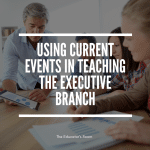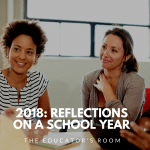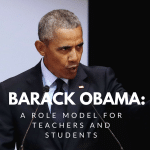Have you signed up for The Educator’s Room Daily Newsletter? Click here and support independent journalism!
When I started teaching high school English twenty years ago, my main focus was on preparing my students for college.
It took me years of teaching, parenthood, a graduate degree, and personal distress about our national politics to finally convince me that I had it all wrong.
I understand now that college isn’t necessary for students’ future personal and financial success.
What matters to me more than their ability to get a college degree is their ability to meaningfully participate as productive members of society. This means preparing my students to be active participants in their communities. I need them to also be informed voters who understand the implications of their decisions on themselves, their families, and their neighbors.
I needed to prepare them for citizenship.
College isn’t the end goal
For years, we’ve been inundated by the charge to prepare our students for college. This is a dubious task, considering that a large percentage of our graduated seniors do not attend four-year universities. While the numbers were most likely impacted by the pandemic, according to the Bureau of Labor Statistics, only 62.7 percent of high school seniors enrolled in school in 2020. This was down from 66.2 percent in 2019. Regardless of what the other nearly 40% of students are choosing to do post-graduation, we should be planning for them to be tax-paying, voting members of our society with a wide range of working responsibilities.
Operating under that assumption matters to all of us.
Instead of preparing our students for college, we should be preparing them for citizenship. While the approach to both might be the same, this change in mindset shifts our focus from what some of our students need to what all of our students need. That doesn’t mean that we do not push and challenge those with the intention of becoming college students. Instead it means actually raising the bar for every student. This happens when we no longer see school as a means to an end in the job market, but instead as a way to prepare future voters for meaningful citizenship.
We so frequently say, “You’ll need to know this when you get to college.” I have to ask, will they really need to know that when they get to college?
What about the kid who has no intention of going to college but then decides to go back years later?
What about the kid who is a good enough student to go to college but they have decided it is better for them to go to trade school?
What about the kid who decides to go to the military first and then go to college?
What about the kid who has no idea what they want to do and ends up changing their major multiple times before settling on one?
Education must serve the needs of all of our students because regardless of their professional choices, they will be participating in our economy and eligible to vote once they turn 18.
Education makes us better citizens
When we see K-12 education as preparation for citizenship, we do so understanding that active citizenship requires mastery and the ability to apply all of the basics that we are already teaching them. Math matters because it teaches critical thinking and prepares them for budgeting their finances and understanding interest rates. Science matters because it helps them understand news reports discussing real issues that affect them, such as diseases, climate change, and major life-changing breakthroughs. Social studies matter because it informs our understanding of our present and helps us understand how to make a better future. It is also important to note that only one in three Americans can pass a citizenship test and a recent survey showed that 23% of adults 18-39 believe that the Holocaust is a myth, exaggerated, or unsure about its history. This lack of knowledge seriously impacts how people vote related to national and foreign policy. Foreign languages matter because we live in a multilingual society and they might eventually have coworkers or even employees that speak a different language. English Language Arts matter because they teach critical thinking, essential communication skills, and improve reading skills so that students can effectively learn all of the previously mentioned items.
Changing why we are teaching something doesn’t necessarily change what we are teaching, but it could certainly transform how we are teaching it and student motivation for learning it.
Why does it matter?
In the last year we have seen state legislatures pass and attempt to pass legislation aimed at limiting what our students learn instead of improving how they are learning. We’ve watched lawmakers attack teachers and librarians for making inclusive books available to all kids. These are books that evoke empathy in some and helps others feel seen, literature that encourages disenfranchised children and struggling readers discover a love for books and grow as readers and critical thinkers. We’ve witnessed the chilling effect of anti-anti-racism laws that prevent teachers from teaching the full picture of our history, politics, and economic systems. These legislative moves undercut the skills of empathy and critical thinking that are vital to citizenship.
All of this frightens me as a teacher, mom, and citizen because we need an educated public for our democratic republic to succeed. This isn’t about jobs (although that is also necessary). This isn’t about basic skills (although that is necessary for jobs). This is about whether or not our children have the ability to think for themselves and use their critical thinking to make important decisions for themselves and others.
Progress only happens when our students are encouraged to learn from the past, apply their knowledge and skills to the present, and challenged to imagine how they can use their education to build a better future.
That is how we can work towards a better educational future that serves all of our students.
Editor’s Note: If you enjoyed this article, please become a Patreon supporter by clicking here.






